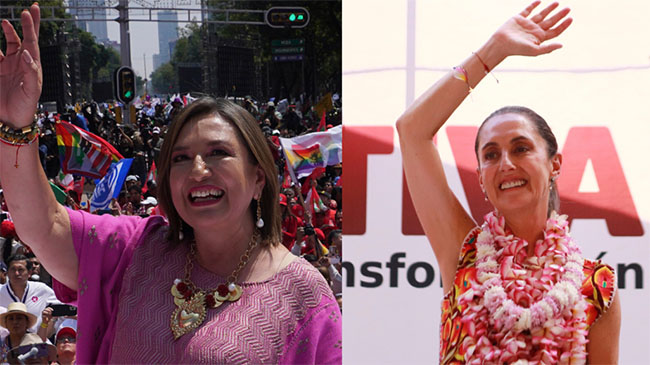by Mexico Institute/Wilson Center
No pun intended, election predictions make horse racing betting look stable.
“Secretariat,” the legendary “Triple Crown” winner, became known for saving energy with a slow start, then overtaking his equine rivals in the final stretch with formidable speed by a long shot. Something similar has happened with the two main presidential candidates in Mexico.
Claudia Sheinbaum was all shades of gray when she started her career. Although intellectually gifted, she has the charisma of a reserved director. Thus, like Secretariat, she seemed like a slow runner until, with the whip of President Andrés Manuel López Obrador (AMLO), she is now far ahead of her adversaries.
In a sense, Claudia has been competing against Sheinbaum, until the appearance of Xóchitl Gálvez in the race in the summer of 2023. Claudia is the model for AMLO, the politician, the woman who has unconditionally followed in her footsteps and has covered the traces of her. Sheinbaum is the scientist, the woman who can discern facts from discourse; However deep in her mind, there is an awareness that the energy sector requires a richer, more diverse and modern range of actors for a just transition.
In this sense, Claudia and Sheinbaum can clash. The poster girl owes her mentor what she is now, that she is no longer a scruffy radical student shouting slogans over a soap box. The stylized woman we see now has promised to expand the energetic legacy of her creator. If so, Sheinbaum is in trouble and may have to step back to allow Claudia to plead the case for a gigantic refinery in Tabasco that is still under construction and does not guarantee cheaper, less polluting fuels.
Xóchitl Gálvez’s performance on the track is exactly the opposite. She unexpectedly walked onto the lawn and the crowd woke up. However, what began as a boom soon turned into a crisis. In the recent survey conducted by El Universal, one of Mexico’s leading newspapers, Gálvez was 30 points behind Claudia. The equestrian analogy is apt. Like Secretary, the one who starts slowly is the one most likely to win.
Gálvez’s decline may have begun with his remarks suggesting that Pemex be privatized, a comment no Mexican politician ever made publicly. The rest of his energy platform is within the establishment consensus of the market-oriented “transition,” although some parts are unrealistic, namely that Pemex must be a leading producer of hydrogen. The revival of energy auctions, greater private investment in clean energy and unprecedented efforts in reducing greenhouse gas emissions, although heretical for the moment in Mexico, are fairly standard objectives in global energy policies.
The unusual thing about Gálvez is that he lacks filters. It is not what he says but his way of expression that makes him an outlier in the political system. Energy is a piece of junk and it is a bull that tramples on the crudest sensibilities. She is a foul-mouthed iconoclast when she talks about Mexico’s most sacred issue: “energy sovereignty” which, from a political perspective, clashes even with a partial privatization of Pemex.
Claudia has tried to make peace with Sheinbaum, but Xóchitl’s presence still looms, particularly as a recent poll by Alejandro Moreno in El Financiero shows that Xóchitl only trails Claudia by 16 points. In early November, she announced a 30-year plan for the energy sector that includes private investment, to modernize the industry and achieve the public good. The question remains whether this scheme will truly decarbonize Mexico, improve market dynamics and, most importantly, secure the path to a just energy transition.
This article was originally published by the Wilson Center’s Mexico Institute.
Miriam Grunstein (PhD) is currently an independent attorney whose experience in the energy sector began 21 years ago as a personal advisor to a Commissioner of the Federal Energy Regulatory Commission (CRE) of Mexico. She is currently a non-resident scholar at the Mexico United States Center of the James Baker Institute of Rice University.
EDITOR’S NOTE:
In a tour of the networks, we found statements by Gálvez that refute what the article above says, ‘that she advocates the privatization of Pemex’.
According to Animal Político, Xóchitl Gálvez did not say that her dream is to privatize Pemex. President Andrés Manuel López Obrador was, during his press conference on September 8, the one who said that it “helps that Xóchitl wants to privatize Petróleos Mexicanos (Pemex).” From there a video emerged that was manipulated, which Xóchitl Gálvez said about privatizing Pemex because in her original statement she said that he ‘wants to modernize the parastatal company.’
Xóchitl responded:
“President, I already know that he has his eye on me (…) what I demand is that he measures his words. He now says that I am going to privatize Pemex. Another lie. And since I already know that you only promise the replicas, but do not fulfill them, here I will explain quickly. My dream as a senator is to modernize Pemex and CFE, companies that understand the world, that are at the forefront, that take care of the planet and are useful to all Mexicans.” https://youtu.be/t5pwY-Uf8Bc
Despite previous statements, this video by Xóchitl Gálvez was manipulated. She said that she wants to modernize Pemex and CFE, not privatize the state oil company as the video on social networks says.



